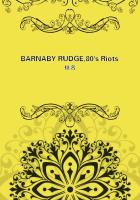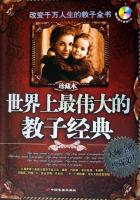God bless him! his hand was a little unsteadied by all the whisky-punch he had taken, but it was plain to see his heart was for poor Judy. My heart was all as one as in my mouth when I saw the halfpenny up in the air, but I said nothing at all; and when it came down I was glad I had kept myself to myself, for to be sure now it was all over with poor Judy.
'Judy's out a luck,' said I, striving to laugh.
'I'm out a luck,' said he; and I never saw a man look so cast down: he took up the halfpenny off the flag, and walked away quite sober-like by the shock. Now, though as easy a man, you would think, as any in the wide world, there was no such thing as ****** him unsay one of these sort of vows, which he had learned to reverence when young, as I well remember teaching him to toss up for bog-berries on my knee. [VOWS.--It has been maliciously and unjustly hinted that the lower classes of the people of Ireland pay but little regard to oaths; yet it is certain that some oaths or vows have great power over their minds. Sometimes they swear they will be revenged on some of their neighbours;this is an oath that they are never known to break. But, what is infinitely more extraordinary and unaccountable, they sometimes make and keep a vow against whisky; these vows are usually limited to a short time. A woman who has a drunken husband is most fortunate if she can prevail upon him to go to the priest, and make a vow against whisky for a year, or a month, or a week, or a day.] So I saw the affair was as good as settled between him and Miss Isabella, and I had no more to say but to wish her joy, which I did the week afterwards, upon her return from Scotland with my poor master.
My new lady was young, as might be supposed of a lady that had been carried off by her own consent to Scotland; but I could only see her at first through her veil, which, from bashfulness or fashion, she kept over her face.
'And am I to walk through all this crowd of people, my dearest love?' said she to Sir Condy, meaning us servants and tenants, who had gathered at the back gate.
'My dear,' said Sir Condy, 'there's nothing for it but to walk, or to let me carry you as far as the house, for you see the back road is too narrow for a carriage, and the great piers have tumbled down across the front approach; so there's no driving the right way, by reason of the ruins.'
'Plato, thou reasonest well!' said she, or words to that effect, which I could noways understand; and again, when her foot stumbled against a broken bit of a car-wheel, she cried out, 'Angels and ministers of grace defend us!' Well, thought I, to be sure, if she's no Jewish, like the last, she is a mad woman for certain, which is as bad: it would have been as well for my poor master to have taken up with poor Judy, who is in her right mind anyhow.
She was dressed like a mad woman, moreover, more than like any one I ever saw afore or since, and I could not take my eyes off her, but still followed behind her; and her feathers on the top of her hat were broke going in at the low back door and she pulled out her little bottle out of her pocket to smell when she found herself in the kitchen, and said, 'I shall faint with the heat of this odious, odious place.'
'My dear, it's only three steps across the kitchen, and there's a fine air if your veil was up,' said Sir Condy; and with that threw back her veil, so that I had then a full sight of her face.
She had not at all the colour of one going to faint, but a fine complexion of her own, as I then took it to be, though her maid told me after it was all put on; but even, complexion and all taken in, she was no way, in point of good looks, to compare to poor Judy, and withal she had a quality toss with her; but maybe it was my over-partiality to Judy, into whose place I may say she stepped, that made me notice all this.
To do her justice, however, she was, when we came to know her better, very liberal in her housekeeping--nothing at all of the skinflint in her; she left everything to the housekeeper, and her own maid, Mrs. Jane, who went with her to Scotland, gave her the best of characters for generosity. She seldom or ever wore a thing twice the same way, Mrs. Jane told us, and was always pulling her things to pieces and giving them away, never being used, in her father's house, to think of expense in anything; and she reckoned to be sure to go on the same way at Castle Rackrent;but when I came to inquire, I learned that her father was so mad with her for running off, after his locking her up and forbidding her to think any more of Sir Condy, that he would not give her a farthing; and it was lucky for her she had a few thousands of her own, which had been left to her by a good grandmother, and these were very convenient to begin with. My master and my lady set out in great style; they had the finest coach and chariot, and horses and liveries, and cut the greatest dash in the county, returning their wedding visits; and it was immediately reported that her father had undertaken to pay all my master's debts, and of course all his tradesmen gave him a new credit, and everything went on smack smooth, and I could not but admire my lady's spirit, and was proud to see Castle Rackrent again in all its glory. My lady had a fine taste for building, and furniture, and playhouses, and she turned everything topsy-turvy, and made the barrack-room into a theatre, as she called it, and she went on as if she had a mint of money at her elbow; and to be sure I thought she knew best, especially as Sir Condy said nothing to it one way or the other. All he asked--God bless him!--was to live in peace and quietness, and have his bottle or his whisky-punch at night to himself. Now this was little enough, to be sure, for any gentleman; but my lady couldn't abide the smell of the whisky-punch.
'My dear,' says he, 'you liked it well enough before we were married, and why not now?'
'My dear,' said she, 'I never smelt it, or I assure you I should never have prevailed upon myself to marry you.'














